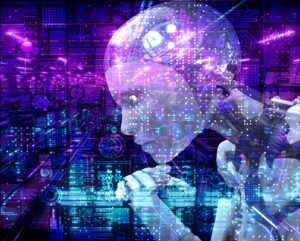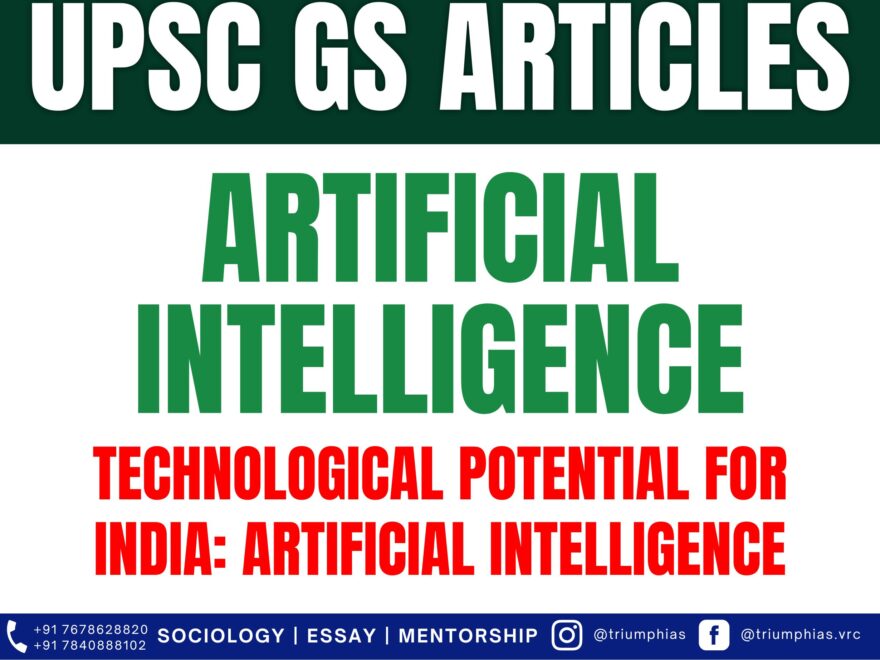Artificial Intelligence
(Relevant for GS paper-3)

Generative Artificial intelligence (AI) refers to AI systems that have the ability to generate novel data. In today’s world, we can find numerous examples of generative AI applications, primarily used to produce text, images, and code based on user input. However, it is important to note that generative AI possesses the potential for much broader capabilities beyond its current usage
The extensive adoption of generative AI has truly magnified its capabilities, evoking a sense of awe initially, followed by concerns. Open AI’s Chat GPT, chatbot stands out as a prime example of how well intelligence can be mimicked by generative AI. In recent years, AI models powered by neural networks, trained on vast datasets, and equipped with substantial computational power have been utilized for various beneficial purposes, such as discovering new antibiotics and alloys, providing engaging entertainment, and contributing to cultural activities. However, it is the ability of generative AI to fabricate data that has garnered significant attention. Presently, the world faces the challenge of distinguishing between authentic data that accurately reflects reality and manipulated data crafted by malicious actors leveraging AI technology.
Benefits of Generative AI
- Content Creation: Generative AI revolutionizes the content creation process by automating the production of diverse content types, including text, images, videos, music, and more. Industries such as advertising, entertainment, and marketing benefit greatly from the accelerated content generation facilitated by generative AI.
- Personalization: Generative AI empowers personalized experiences for users by leveraging their preferences and behavior. Through analyzing user data, generative AI systems deliver tailored recommendations, customized content, and personalized product suggestions, resulting in enhanced customer satisfaction and engagement.
- Creative Assistance: Generative AI serves as a valuable tool for creative professionals, offering support and inspiration. Artists, designers, and writers can harness generative AI to spark ideas, explore uncharted creative territories, and overcome creative blocks. It acts as a collaborative partner, providing fresh perspectives and assisting in the creative process.
- Data Augmentation: Generative AI generates synthetic data that closely resembles real data, addressing the need for large labelled datasets in machine learning applications. By augmenting existing datasets with synthetic data, generative AI contributes to improving the performance and generalization of machine learning models.
- Simulation and Training: Generative AI facilitates the creation of Realistic virtual environments for training purposes. Industries such as autonomous vehicles and robotics can utilize generative AI to simulate scenarios, allowing algorithms to be trained and systems to be tested without the need for physical resources or compromising safety.
- Problem Solving: Generative AI excels in problem-solving tasks, such as discovering new drug compounds, optimizing supply chain logistics, and creating efficient designs. By exploring extensive solution spaces, generative AI algorithms propose innovative solutions, accelerating the discovery process.
- Virtual Characters and Agents: Generative AI breathes life into virtual characters and agents by endowing them with generative capabilities. These virtual entities exhibit natural language understanding, engage in dynamic interactions with users, and adapt to various situations. Applications range from virtual assistants and chatbots to gaming and virtual reality.
- Art and Entertainment: Generative AI unlocks fresh horizons for artistic expression. It generates unique artwork, composes music, produces lifelike animations, and even creates entire stories or scripts. This fusion of human creativity and machine intelligence paves the way for captivating possibilities in the realms of art and entertainment.
Threats from Generative AI
- Hallucinations: These are the fallacies that AI models can experience due to their non-human nature, relying solely on data and training to produce responses. At times, generative AI models can generate outputs that are nonsensical, erroneous, or deceptive, lacking the critical thinking and contextual understanding of human cognition.
- Deep fakes: These are the fabricated media artefacts that generative AI models can craft by manipulating or merging pre-existing images, videos, or audio. Deep fakes possess the potential for malicious exploitation, enabling the dissemination of disinformation, impersonation of individuals, or even blackmail schemes, posing significant threats to trust, authenticity, and personal integrity.
- Data Privacy: Generative AI models necessitate vast amounts of data for learning and output generation. However, this data often contains sensitive or personal information that can be jeopardized or misused by unauthorized entities. Additionally, generative AI models may gather user data without explicit consent or knowledge, raising concerns regarding privacy infringement and surveillance.
- Cyber security: Hackers can employ generative AI models to devise novel and sophisticated forms of malware, phishing tactics, or other cyber attacks that can evade traditional security measures. Such breaches can have severe consequences, including data breaches, financial losses, or irreparable damage to an individual’s or organization’s reputation.
- Copyright Issues: Generative AI models have the ability to generate content resembling or replicating existing human-made creations, such as text, music, or art. This poses ethical and legal dilemmas surrounding the ownership, attribution, and rights associated with both the original and generated content, calling for a careful examination of intellectual property laws and fair use principles.
Benefits that can be harnessed through Generative AI
- Healthcare: Generative AI revolutionizes healthcare by enhancing the accuracy of disease diagnosis and treatment through advanced analysis of medical images and data. It enables precise prediction of patient outcomes and facilitates proactive preventive measures for improved healthcare outcomes.
- Education: Generative AI transforms education by enabling the creation of personalized learning materials and assessments tailored to individual students’ abilities and interests. It empowers teachers with automated grading, constructive feedback, and innovative curriculum design, fostering a more effective and engaging learning environment.
- Agriculture: Generative AI revolutionizes agriculture by optimizing crop yield and quality through data-driven recommendations for irrigation, fertilization, pest control, and harvesting. By leveraging weather patterns, soil conditions, and plant data, it empowers farmers to make informed decisions and maximize agricultural productivity.
- Manufacturing: Generative AI revolutionizes manufacturing by facilitating the design and production of innovative products and services that align with customer preferences and market trends. It utilizes deep analysis of consumer behavior and market dynamics to drive efficient production processes, ensuring enhanced efficiency and quality control.
- Entertainment: Generative AI redefines entertainment by unleashing new frontiers in art, music, literature, and gaming. It fosters the creation of captivating and inspiring content that resonates with diverse audiences. Additionally, it enables personalized content recommendations and targeted advertisements based on individual preferences, elevating the overall entertainment experience
India do to Overcome Challenges posed by Generative AI
- Establishing a robust and all-encompassing regulatory framework that precisely defines the purpose, extent, and guiding principles of generative AI regulation. This framework must strike a delicate balance between safeguarding individuals against potential risks while fostering an environment conducive to innovation and economic advancement.
- Constructing a liability framework that is both equitable and accurate, attributing responsibility and accountability for the actions and consequences of generative AI systems. This framework should carefully delineate the roles and obligations of various stakeholders, including developers, providers, users, and regulatory entities.
- Incorporating indispensable regulatory elements such as transparency, accountability, privacy, security, ethics, and human oversight. These elements are vital to ensure that generative AI systems inspire trust, demonstrate reliability, and uphold human rights and values.
- Investing in extensive research and development of generative AI technologies that specifically address India’s unique requirements and challenges. Leveraging its strengths in data science, engineering, and entrepreneurial spirit, India can pioneer innovative solutions across diverse sectors and domains.
- Nurturing collaboration and cooperation among diverse stakeholders, including government bodies, industry leaders, academic institutions, civil society organizations, and international partners. India should actively engage in constructive dialogues and knowledge sharing with other nations and regions that excel in the development and regulation of generative AI, fostering an atmosphere of collective progress and the exchange of best practices.
Generative AI holds immense potential to revolutionize India and bring about numerous advantages for its population. Yet, alongside its promises, it presents significant challenges and risks that demand diligent and responsible regulation. It is crucial for India to adopt a proactive and well-balanced stance towards the implementation of generative AI, prioritizing the assurance of safety, security, and ethical practices. By doing so, India can harness the full potential of this powerful technology while safeguarding the interests and well-being of its people.
To master these intricacies and fare well in the Sociology Optional Syllabus, aspiring sociologists might benefit from guidance by the Best Sociology Optional Teacher and participation in the Best Sociology Optional Coaching. These avenues provide comprehensive assistance, ensuring a solid understanding of sociology’s diverse methodologies and techniques.
generative AI, AI systems, content creation, personalization, creative assistance, data augmentation, simulation and training, problem solving, virtual characters and agents, art and entertainment, threats, deep fakes, data privacy, cyber security, copyright issues, benefits, healthcare, education, agriculture, manufacturing, entertainment, India, regulation, collaboration, innovative solutions, Best Sociology Optional Teacher, Best Sociology Optional Coaching, Sociology Optional Syllabus.

